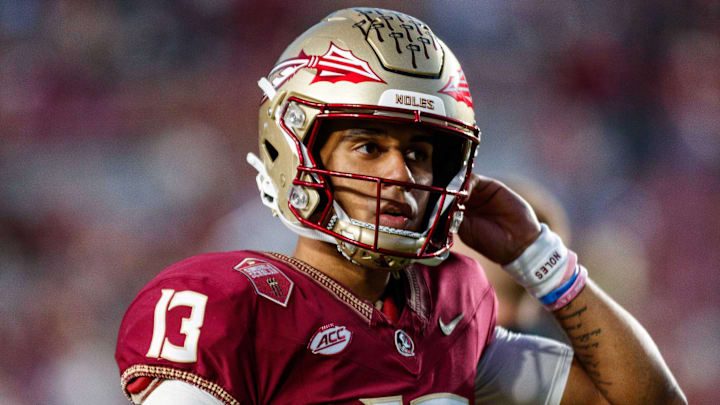While the NY Jets are focused on capitalizing on their window of opportunity with Aaron Rodgers as their quarterback, the organization also knows it's important to plan for life in the post-Rodgers era.
That's why it came as little surprise when the Jets selected Florida State quarterback Jordan Travis in the fifth round of this year's NFL Draft. The Jets did their homework on Travis prior to the draft, bringing the former Heisman candidate in for a top-30 visit.
Of course, many immediately jumped to the conclusion that Travis could be Rodgers' future successor at quarterback for the Jets. And while there's an outside chance that could happen, that's not why the Jets drafted him.
The Jets don't see Travis as Rodgers' eventual replacement. It would, of course, be a welcome surprise if he developed into a player who could eventually start, but that's not what the team envisions as his long-term role.
The NY Jets hope Jordan Travis can develop into a long-term backup QB
Travis was one of the most dynamic and exciting players in college football last season and was widely seen as a potential Day 2 pick and Heisman finalist before a gruesome leg injury ended his season prematurely.
That injury tanked his draft stock and kept him sidelined for spring practices. It's unclear when the Jets expect Travis to return to the field, but it seems likely that he will miss at least some (if not all) of training camp.
That's not ideal for a young quarterback the Jets are hoping to develop, but the good news is that Travis isn't expected to play in 2024. The Jets fully anticipate the upcoming season to be a "redshirt" year for the former Florida State star.
Travis will enter the season as the Jets' third-string quarterback behind Rodgers and veteran Tyrod Taylor. He's a developmental project, but instead of developing him to be Rodgers' replacement, the Jets hope he can eventually supplant Taylor as the team's QB2.
The hit rate on Day 3 quarterback prospects is exceptionally low. Of the 88 quarterbacks selected on Day 3 of the NFL Draft between 2010 and 2023, only three have become actual long-term starters: Kirk Cousins, Dak Prescott, and Brock Purdy.
Teams typically don't take swings on Day 3 quarterback prospects with the expectation that they could become future starters. Instead, the goal is for those Day 3 draft picks to develop into cheap and affordable backup quarterbacks.
The Jets put an emphasis on improving their backup quarterback situation this offseason, signing Tyrod Taylor to a two-year, $12 million contract with $8.5 million in guarantees. His cap hit in 2025 will be nearly $7 million.
That's a hefty premium to pay for a player who, in an ideal world, will never play a single meaningful down for the team. Taylor is an important insurance policy, but he's an expensive one.
The hope with Travis is that he can serve that same role as a much-needed insurance policy but at a significant discount. Travis's cap hit won't exceed $1.6 million for the duration of his four-year rookie contract.
If the Jets can develop him into a viable backup, they would be able to save a significant amount of money on the quarterback position. That money could then be allocated elsewhere, allowing the team to upgrade other areas of the roster.
The NFL salary cap is akin to a complex puzzle, where every piece needs to be strategically placed to build a championship team. By saving on a backup quarterback with a rookie contract, teams free up valuable cap space, enabling them to invest more heavily in other key positions and enhance their overall roster strength.
That's the value the Jets hope to extract from Jordan Travis, and his rookie redshirt year learning behind both Rodgers and Taylor should do wonders for his long-term development.
This article is part of the "Summer Spotlight" series on The Jet Press, dedicated to highlighting individual players on the Jets roster throughout the summer. Stay tuned for more features as we provide in-depth profiles and insights on various Jets players before the season kicks off.
More Summer Spotlight Content:
